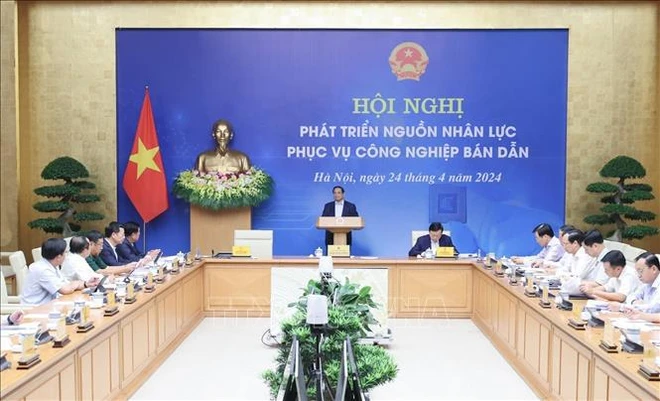Human resources development in semiconductors should be considered a breakthrough in personnel training, Prime Minister Pham Minh Chinh said at a conference in Hanoi on April 24.

Calling the industry a strategic option of Vietnam, the government pointed to its five pillars, one of them being human resources.
The Party and the State have adopted many policies and guidelines on the comprehensive development of human resources, science-technology, and innovation, which are being implemented effectively, he said.
Chinh reiterated the conclusion made at the eighth plenum of the 13th Party Central Committee on October 18, 2023, which sets the target of developing a pool of between 50,000 and 100,000 high-quality personnel for semiconductor chip manufacturing by 2030.
The PM noted that the Government has issued a strategy on science-technology and innovation development by 2030, with priorities given to semiconductors, adding ministries and agencies have been asked to implement a project on human resources development in semiconductors by 2030, and devise a strategy for the industry by that time.
With the National Innovation Center (NIC), and many concentrated IT parks, the domestic semiconductor industry would thrive, the PM believed.
Notably, nearly 160 out of about 240 universities across the country are providing technology training, which would be expanded to semiconductors, and 35 educational institutions are offering majors related to semiconductors.
The PM emphasised the memorandum of understanding inked by Vietnam and the US on developing the semiconductor ecosystem, which also highlights personnel cooperation in this regard.
Giants like NVIDIA and Samsung also have also shown their interest in research, investment and development, aiming to build semiconductor manufacturing facilities in Vietnam, he continued.
These are important premises and favourable opportunities for the country to participate in the semiconductor industry through high-quality human resources development, he said.
The PM, however, mentioned some challenges relating awareness, workforce, finance, protection policies, and competitiveness, saying to achieve the personnel target, ministries, agencies, educational institutions, and businesses need to pour investments, diversify resources and boost public-private partnership in this field.
He urged efforts to quickly build and perfect relevant institutions and policies, and investments in infrastructure to serve personnel training, and assigned specific tasks to ministries, agencies and localities.
The Ministry of Planning and Investment will review and perfect the programme on semiconductor human resources development by 2030 with a vision towards 2045, and submit it to the PM for approval within May.
The Ministry of Information and Communications needs to submit the national semiconductor circuit development strategy by 2030, with a vision to 2035, to the PM for approval.
The Ministry of Education and Training was assigned to sketch out a plan on training 30,000 university students to serve the semiconductor chip industry over a five-year period.
Source: Sai Gon Giai Phong News